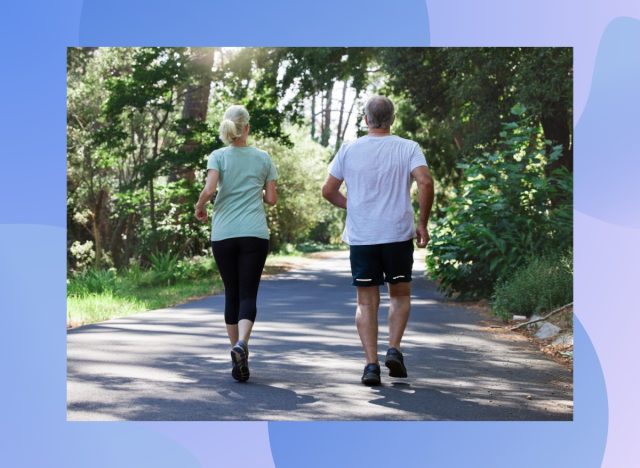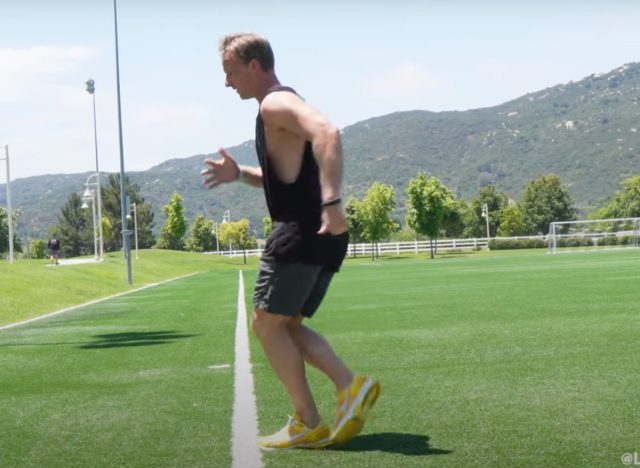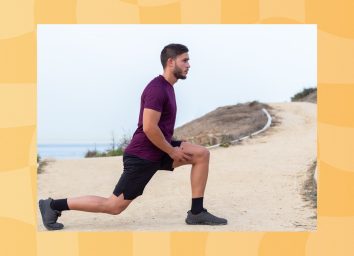Secret Side Effects of Walking Before Breakfast, Says Science

Believe it or not, there are some negative side effects associated with bounding out of bed and exercising on an empty stomach first thing in the AM. If you're doing really rigorous forms of exercise, such as long bouts of high-intensity interval training (HIIT), you may find that your performance begins to flag. "It is not possible to mobilize fat stores and burn enough fat during higher-intensity exercise to provide a steady state of fuel, so once the body runs out of carbohydrates, it will no longer be able to continue working at that intensity," as Katie Kissane, R.D., C.S.S.D., a sports nutritionist and the owner of My Nutrition Coach in Fort Collins, CO, explained to Men's Journal.
However, if you're performing more moderate-intensity exercises such as brisk walking, research has shown that there are tons of benefits to going out at first light—and no, you won't deplete your fuel stores and "bonk." If you're curious to know the amazing side effects your body will experience when you head out in the morning, read on, because we've included a few of them right here. And for more tips for becoming a better walker, don't miss The Secret Cult Walking Shoe That Walkers Everywhere Are Totally Obsessed With.
You'll Burn More Fat

According to a 2017 study published in the American Journal of Physiology: Endocrinology and Metabolism, researchers from the UK's University of Bath found that obese men who walked for an hour before eating were able to activate their stored fat-burning genes far better than the test participants who walked after eating breakfast.
A more recent study conducted by a research team at Bath, which was published in 2020 in the Journal of Clinical Endocrinology & Metabolism, found that participants who performed cardio before eating their first meal of the day experienced double the fat burn compared to those who exercised after eating. "Rates of whole-body lipid utilization"—ie. "fat burn"—"were around 2-fold higher with exercise before versus after carbohydrate provision, and this difference between the conditions was sustained throughout the whole 6-week intervention," observed the study. And for more on the benefits of walking, see here for The Secret Little Exercise Tricks That Will Extend Your Life.
You'll Trick Your Body into Wanting More Exercise Later

As revealed in a new article published in Stylist, one writer changed her entire routine so that she went for long walks every morning as an experiment to see how it would impact her life. She was pleasantly surprised. Among her findings, she discovered that her daily walk actually motivated her to want to do more exercises later. "I now do a short yoga practice most days and try to fit in a stationary bike ride or half an hour of hula hoop dancing a few times a week," she revealed.
"The more you move, the more you have the energy to move," Chloe Clark, a personal trainer and sports massage therapist in the UK, explained to her. "Your body is very clever at evolving to its circumstances."
You'll Reset Your Biological Clock and Prime Your Body for Better Sleep

Research published in Sleep Medicine has noted major sleep quality improvements among insomniacs after they started walking and exercising in the morning. "Light brings your body clock forward," says Michael Mosley, MD, host of the BBC Radio 4 podcast "Just One Thing." "So in the evening, when you want to go to sleep, your body is ready for it. If you're struggling to sleep at night, it could be because you're not getting enough bright light in the morning."
He further explained: "Because our clocks run longer than 24 hours, it's important to reset your body clock every morning with exposure to the morning's blue light, which our receptors are especially sensitive to. Light helps to reset our internal body clock. Exposure to light also suppresses the production of melatonin, the hormone that encourages us to go to sleep." And for some major walking no-nos, check out the Bad Walking Habits Every Walker Should Quit, Say Experts.
You'll Hack Your Body to Make Better Decisions

A 2019 study published in the British Journal of Sports Medicine found that doing 30 minutes of moderate-intensity—such as brisk walking—in the morning not only improves you cognitive performance (more on that later) but also improves the cognitive functions associated with smarter and better decisions. "Sedentary behavior is associated with impaired cognition, whereas exercise can acutely improve cognition," write the authors.
You'll Slash Your Heart Disease Risk

According to research compiled by The Heart Foundation, a 30-minute walk each day may cut your heart disease risk by as much as 35-40%. What's more, they note that a morning walk can also improve blood circulation, lower blood pressure, and help prevent (or control) diabetes. And for more walking tips, see these Secret Tricks for Walking for Exercise, According to Walking Experts.
You Can Focus Better at Work

Scientific research has routinely linked taking brisk walks with enhanced creativity and innovating thinking. "Prior to taking up walking, I found it difficult to stick to a morning routine that would get me into a focused state for work," observes the Stylist writer and morning walker. "Getting fresh air and exercise first thing, however, has completely transformed that. Instead of being tempted to mindlessly scroll social media for an hour, I'm now ready to get to my desk and dive right into work."
As Jan P. de Jonge, a leading sports, business, and behavioral psychologist, explained to her: "Walking helps you create new ideas. The advice is clear: to walk is to take steps in a beneficial direction."
You'll Instantly Extend Your Life

A big study published in 2015 in The American Journal of Clinical Nutrition found that a brisk 20-minute walk every day—no matter the time of day—could reduce your risk of death by upwards of 30%. And if you're an avid walker, make sure you're aware of Exactly How Much Water You Should Drink Every Day.








